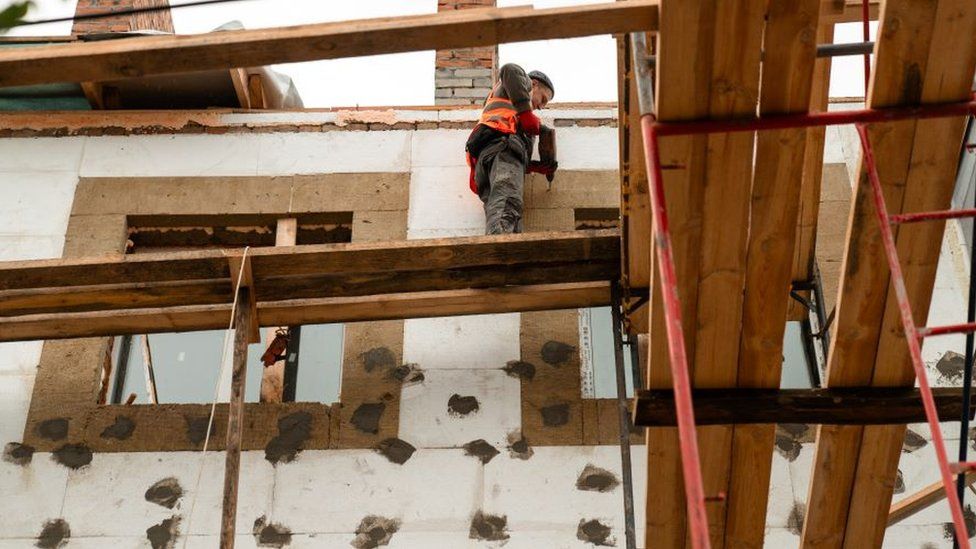-

-
-
Loading

Loading

Western donors have pledged billions of dollars to support the reconstruction efforts in Ukraine, a country known for its high levels of corruption. This reconstruction is expected to be the largest project of its kind since World War Two. The Ukrainian government aims to demonstrate newfound transparency and accountability through a flagship project in Bucha, a town that was heavily damaged at the beginning of the war. Approximately 245,000 buildings, including many homes in Bucha, were destroyed or damaged during the conflict. Bucha became synonymous with the worst atrocities committed during Russia's full-scale invasion, with Russian occupying forces accused of killing around 500 people. One nine-storey Soviet-era building, caught in the crossfire, has now become a construction site. Most of the 330 residents have temporarily left Bucha, dispersing across Ukraine or seeking refuge abroad. They will only return once the reconstruction is complete in the coming spring. A 71-year-old woman named Anna Prokopyevna, who stayed in her damaged flat throughout the terrifying battle, described how everything was burnt due to the intense bombing. The cost of rebuilding Ukraine was estimated at $411 billion by the World Bank in February of this year, and there has been further destruction since then. International donors have expressed concerns about whether the funds will be properly accounted for. The European Union has emphasized the fight against corruption as a key condition for Ukraine's EU membership aspirations. In the 2022 corruption perceptions index by Transparency International, Ukraine ranked 116th out of 180 countries. The Bucha apartments represent one of the first major housing projects undertaken by Ukraine's new State Restoration Agency, aiming to showcase the country's ability to "build back better." This entails not only constructing modern homes according to residents' preferences but also ensuring that projects are funded, monitored, and accountable in a transparent manner. Achieving transparency is vital to the success of the rebuilding efforts, and civil society groups are spearheading initiatives to promote open and fair reconstruction practices. To address concerns about corruption, the Restoration Agency redesigned the bidding procedure for contracts before beginning the reconstruction in Bucha. Valeriya Ivanova, in charge of anti-corruption measures at the agency, believes she can make a more significant impact in tackling corruption from within the organization compared to her previous role as an investigative journalist. However, allegations about corruption during earlier stages of rebuilding in Bucha and neighboring towns, handled by local councils rather than the agency, have been raised in hard-hitting videos produced by Bihus.Info, the team Ivanova used to work for. The videos suggest that hundreds of millions of Ukrainian hryvnia intended for reconstruction were distributed without proper oversight or competitive bidding. Officials in the region have been dismissed following the revelations, and Taras Shafranskyi, the secretary of Bucha town council, maintains that no violations were discovered by the state audit service and the reconstruction work was of high quality. The damage to the region's reputation with international donors due to these allegations is seen as detrimental. However, it is crucial to acknowledge and learn from the mistakes to prevent them from recurring, according to Olexiy Yarylchenko, a reporter. Silence would only lead to a totalitarian state, he warns. Ukraine has introduced an online transparency platform called Dream, developed jointly by the government and civil society organizations. It aims to facilitate the detection of potential corruption in rebuilding projects without solely relying on journalists exposing misconduct. This tool enables anyone to access documents related to the planning, implementation, and financing of reconstruction projects throughout the country. A new law that requires transparency in all construction is expected to be enacted in the coming year. Viktor Nestulia, the head of the Dream project, believes this unique combination of data will help identify possible collusion and bid-rigging, ultimately combating corruption. In recent years, Ukraine's anti-corruption efforts have shown progress, with the country steadily climbing Transparency International's ranking by 28 places in a decade. President Volodymyr Zelensky's anti-corruption campaign has resulted in high-profile dismissals, including the defense minister, his deputies, the heads of all regional military recruitment offices, and the head of the Supreme Court. Additionally, the defense ministry has resumed publishing its tenders and contracts, a rarity for a country at war. Mustafa Nayyem, the head of the State Restoration Agency, recognizes that Ukraine's rebuilding process will take a significant amount of time due to the widespread destruction caused by the war. This includes repairing 25,000 km of roads and over 400 bridges. Nayyem views the current stage as crucial for Ukraine's survival and winning the fight. Valeriya Ivanova from the Restoration Agency states that the Bucha reconstruction project is not merely about rehousing people but also about shaping Ukraine's future identity after the war.